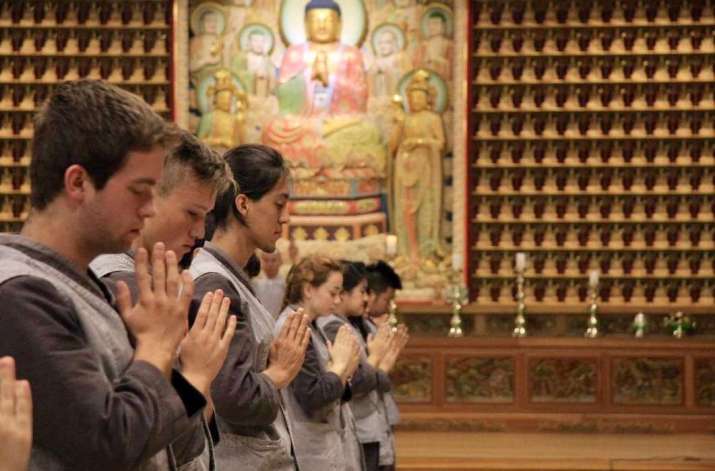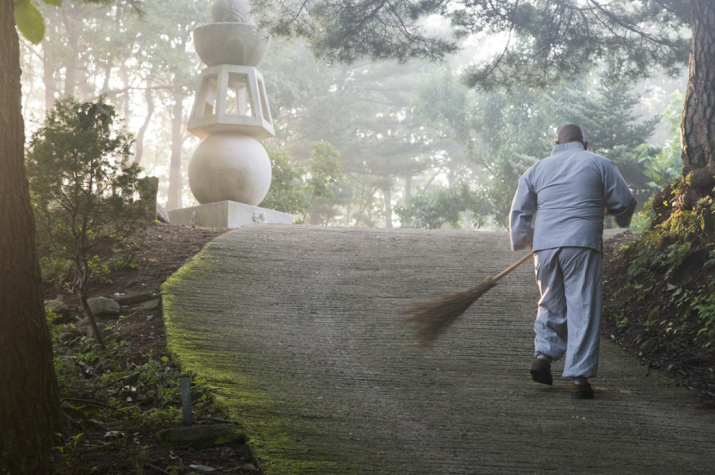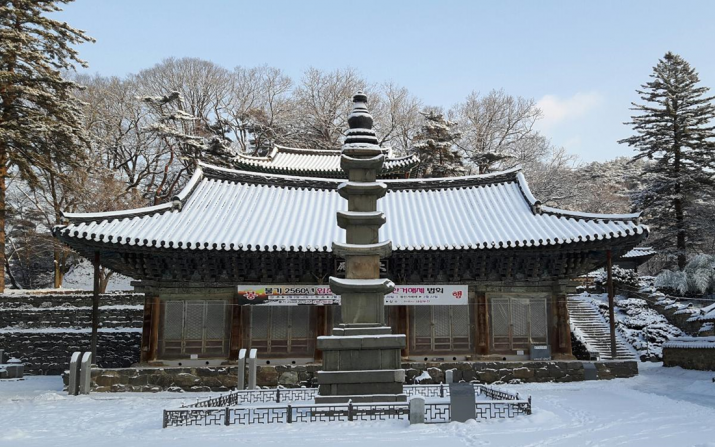NEWS
Korea Resumes Some Buddhist Temple-stay Programs as Social-distancing Rules Ease
 Temple-stay programs are currently limited to individual participants and frontline medical staff. Woljeongsa. From templestay.com
Temple-stay programs are currently limited to individual participants and frontline medical staff. Woljeongsa. From templestay.comThe Cultural Corps of Korean Buddhism (CCKB), an affiliate of the Jogye Order of Korean Buddhism, South Korea’s largest Buddhist order, said on Monday that it has resumed some temple-stay programs after the Korean government relaxed some social-distancing restrictions following a decline in the number of new COVID-19 infections.
After new daily confirmed COVID-19 cases in South Korea remained below 20 for the past several days, the government recently announced that social distancing would be extended for two weeks, although it has eased some rules, stating on Sunday that temples, churches, bars, gyms, and cram schools could resume operating under strict conditions.
In line with the new social-distancing guidelines, the CCKB said, only temple-stay programs for individual participants are currently operating, while group programs remain suspended. The CCKB suspended all temple-stay programs on 24 February due to the novel coronavirus outbreak.*
“Due to the prolonged virus pandemic, many people are depressed and tired. To assist the public in overcoming the ‘corona blues,’ we have decided to resume our Templestay program,” Ven. Wonkyung, senior monastic at the CCKB, said in a statement. “Our decision came after the government decided to ease its social-distancing guidelines.” (The Korea Herald)
The CCKB operates temple-stay programs at 139 Buddhist temples around South Korea. The organization has ordered all temples to strictly follow government regulations regarding the pandemic, which includes installing hand sanitizers, making masks available onsite, regularly sanitizing the temple grounds, and monitoring temple-stay participants daily for any COVID-19 symptoms.
The CCKB is also offering free temple stays for up to 2,000 frontline medical staff at 16 of its temples before 31 October.
The Cultural Corps of Korean Buddhism was established in 2004 to promote Korean Buddhism and traditional Buddhist culture through cultural experience and education programs, exhibitions, and campaigns. In 2019, 70,520 foreigners were reported to have participated in the program.
 Golgulsa in South Chungcheong Province. From templestay.com
Golgulsa in South Chungcheong Province. From templestay.comThe Jogye Order has also announced plans to resume some prayer meetings and other public events at temples across the country, in line with social-distancing rules. Participants will be required to undergo temperature checks before being admitted, and seating will be separated by at least one meter. The Jogye Order had postponed all public events since 23 February, including celebrations for the birth of the Buddha slated for April 30.
Other religious communities in South Korea have also announced plans to resume some public services after moving all public gatherings online.* Of the 16 dioceses of the Catholic Church in South Korea, four, including Seoul and Jeju Island, announced on Monday that they would resume holding onsite Masses alongside those held online, with participants required to wear face masks. According to the Christianity Media Forum of Korea, more than 60 per cent of Protestant churches in the country held onsite services last Sunday, and the number is expected to increase this week.
According to census data for 2015, the majority of South Korea’s population—56.1 per cent—holds no religious affiliation. Christians make up the largest religious segment of the population at 27.6 per cent, while Buddhists account for 15.5 per cent.
After experiencing an early surge in COVID-19 infections when the novel coronavirus first began spreading from China, South Korea, has since become one of the most successful countries in its efforts to contain the outbreak within its borders. While the pandemic continues to spread exponentially in some parts of the world, Korea has reported a decline in the growth of new cases since early March, a success the government has attributed to a strategy dubbed TRUST: transparency, robust screening and quarantine, unique but universally applicable testing, and strict control and treatment.
Within weeks of the first confirmed case being reported in the country, the Korean government acted quickly to develop a test kit for COVID-19. Since then, some 100,000 test kits per day have been produced, and 600 testing sites set up—including drive-through centers, where people can be tested without leaving their cars. Patients are typically informed of their test results by text message within hours. As a result, the fatality rate in Korea has been relatively low, businesses have largely been able to continue operating, and no cities have been locked down.
 Magoksa in South Chungcheong Province. From templestay.com
Magoksa in South Chungcheong Province. From templestay.comAt the time of writing on 22 April, global SARS-CoV-2 coronavirus infections were reported to total 2.57 million, with 177,501 deaths so far confirmed, and 686,634 people recovered.** The World Health Organization in March estimated the mortality rate from the virus at 3.4 per cent, based on incomplete and preliminary data, with the elderly and people with underlying health conditions considered most at risk. South Korea has to date reported 10,694 confirmed infections, with 238 deaths and 8,277 recovered.
* Buddhist Temple Stays Suspended in Korea as Coronavirus Spreads; Religious Gatherings Under Scrutiny
South Korea’s Buddhist Jogye Order Responds to Coronavirus Outbreak
See more
Templestay programs resume, with strict limitations (The Korea Herald)
S. Korean religious community set to resume on-site services (Yonhap News Agency)
Templestay (Cultural Corps of Korean Buddhism)
Related news from Buddhistdoor Global
Korean Zen Master Pomnyun Sunim Offers Buddhist Guidance for Coping with the Pandemic
Korean Buddhist Monk Pomnyun Sunim Wins 37th Niwano Peace Prize
New Museum Reveals Buddhist Mysteries of Korea’s Baekje Kingdom
Related features from Buddhistdoor Global
The Wisdom of Uncertainty
Metta Bangs a Gong
Let there Be Loss
See all coronavirus-related content from Buddhistdoor Global














